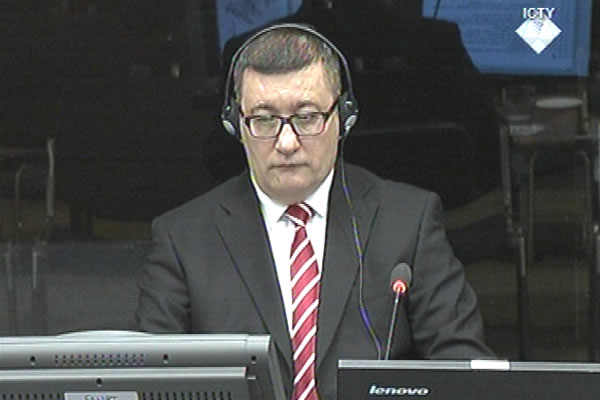Home
‘TOP PROFESSIONAL’ UNINFORMED
Milenko Karisik claims he knows nothing about the Srebrenica operation and that he knew nothing about it when it was launched. The prosecutor contradicted Karisik’s claims with documents that show the witness received reports about the police involvement in the attack on Srebrenica and the imprisonment of the Muslim men. Furthermore, after the war, Karisik issued false papers to soldiers who had taken part in the executions of Muslims at the Branjevo farm
 Milenko Karisik, defence witness at Rako Mladic trial
Milenko Karisik, defence witness at Rako Mladic trial In his statement to Radovan Karadzic – admitted into evidence yesterday in the Ratko Mladic case – police general Milenko Karisik claimed that in July 1995 he knew nothing about the expulsion of Muslim civilians or the imprisonment and eventual execution of the Srebrenica men. At the time he sat in the headquarters in Pale, as a member of the staff there, and dealt only with the Sarajevo battlefield, the witness contended. According to Karisik, he was not involved in any way in Srebrenica.
As he was questioned by the judges today, the witness elaborated on his previous statement, saying that in fact he does not know now what happened after the fall of Srebrenica. ‘At this point in time I don’t know that civilians were deported, I know only that Muslim soldiers were detained’, the witness stated, only to balk again and say that in fact he had no knowledge now about the arrests. ‘I may have been misunderstood’, the witness said laconically by way of explanation when asked how two contradictory statements could be reconciled.
Prosecutor Melissa Pack tried to establish what the witness could have known during the Srebrenica operation. In addition to being a member of the Police Staff in Pale, the witness was chief of Public Security Department, which was headquartered in Bijeljina. The witness confirmed that he was considered a ‘top professional’. Also, Karisik didn’t deny that on 10 and 11 July 1995 – at the time of the Srebrenica operation – he met twice with Karadzic. However, Karisik noted, they talked only about the Sarajevo battlefield.
The prosecutor showed the witness a document drafted on 10 July 1995 and signed by deputy interior minister Tomislav Kovac. The order dispatches an element of the MUP forces headed by Ljubomir Borovcanin from the Sarajevo battlefield to Srebrenica. Borovcanin was the deputy commander of a special police brigade. The order was addressed to the MUP Staff in Pale. Karisik said he was ‘merely a member of the staff’ and he 'could not be sure' if he had seen the order. The witness was asked if he knew that the policemen in the special brigade killed more than 1,000 prisoners in the Kravica warehouse on 13 July 1995. Unsurprisingly, Karisik replied that he ‘didn’t know anything' at the time. After the war he heard ‘about the incident from the media’.
Because he was "just a staff member’, he didn’t read Borovcanin’s cable sent on 13 July 1995 to the Pale Staff. In the cable, Borovcanin reports that about 200 Muslims were killed and about 1,500 detained in the fighting around Konjevic Polje. The ‘figure is rising by the hour’, Borovcanin noted in the cable. That same day Dragan Kijac, chief of the State Security Service, sent a report to Karisik, informing him that 300 Muslims had been captured the previous night, also near Konjevic Polje. Karisik explained that the document was ‘for information only’, which meant that he didn’t have to read it. The witness changed his claims as needed: at one point, he said that he had spent most of the July 1995 in Bijeljina, only to contradict himself a moment later by claiming he had been in Pale for most of the time.
The prosecutor produced evidence showing that Karisik’s involvement in the Srebrenica operation extended to January 1996. On the orders of Dragan Kijac, who became the police minister after the war, Karisik was involved in the effort to issue false documents to the members of the VRS 10th Sabotage Detachment, which had taken part in the executions of Srebrenica prisoners at the Branjevo farm near Zvornik. The document specifies that those persons were ‘foreign citizens’ and persons indicted by the Tribunal. Karisik didn’t see anything controversial about it. ‘All the police forces in the world’ issue false documents when necessary; in this case it was done at the request of the military intelligence service. The witness claimed he was unaware at the time that the purpose of the exercise was to protect those persons from criminal prosecution. In fact, Karisik claimed today he was not sure if he had known at the time that the Tribunal in The Hague existed.
Linked Reports
- Case : Mladic
- 2015-03-16 WERE BOSNIAN SERBS FORCED TO SPLIT FROM BH INTERIOR MINISTRY OR WAS IT ALL PART OF A PLAN
- 2015-03-12 IMPUNITY POLICY IN REPUBLIKA SRPSKA ARMY
- 2015-03-12 MLADIC'S DEFENSE: MORE TIME AND MONEY FOR TOMASICA INVESTIGATION
- 2015-03-18 UPLEASANT STENCH OF DEAD BODIES
- 2015-03-19 FROM DEFENSE TO SELF-DEFENSE
- 2015-03-20 PROSECUTION OPPOSES FOUR-MONTH BREAK AT MLADIC TRIAL
